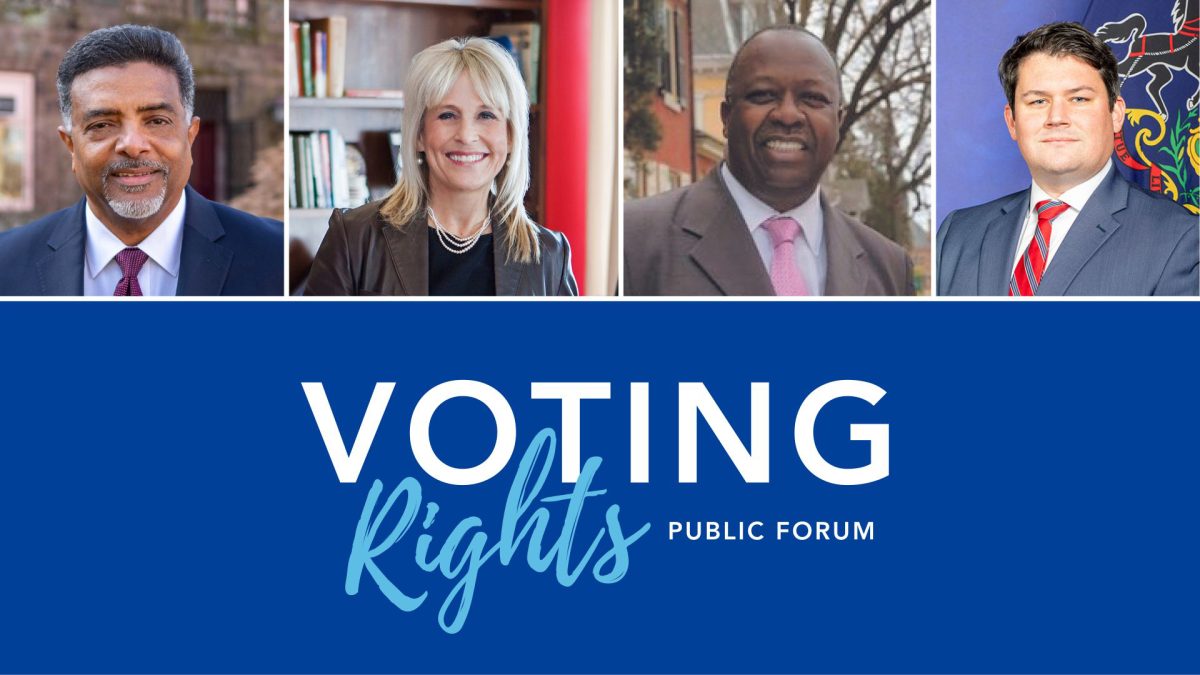On Feb. 15, the Newtown Bucks campus hosted a voting rights panel in honor of Black History Month to educate voters on the current climate of voting rights and how voting rights can be addressed in both Bucks County and the United States.
The panel was composed of Diane Ellis-Marseglia, Chair of the Bucks County Board of Commissioners; Robert Harvie, Vice Chair of the Bucks County Board of Commissioners; John Jordan, First Vice President of the National Association for the Advancement of Colored People, Bucks County and Kevin Antoine Associate Vice President of External Affairs and Chief Diversity Officer at Bucks, who also served as the panel’s moderator.
The panelists first discussed the need for continuous adoption of new voting laws and why this legislation is still needed even though the 15th Amendment gave people, specifically African Americans, the right to vote.
“We need new laws constantly because there’s an attack on voting rights constantly,” Jordan led with. The panel discussed the history of voter suppression and how there has been slow progress toward voting rights throughout the history of our country.
Commissioner Harvie examined a turning point for voting rights that happened during the Vietnam War due to the fact that the average age of U.S. citizens going to fight was below the legal age to vote. “Most of those young men who lost their lives couldn’t even vote for the leaders that sent them there,” Harvie added.
While the need for voting rights legislation was already present, the controversy surrounding the war introduced the need for consistent new legislation to stay in tune with current political climates instead of honoring past political agendas.
Voter suppression legislation continues to be a relevant issue and is largely propounded by a demographic of people saying we need stronger laws to control who’s voting, thus ignoring the sentiment of democracy.
This yielded the example of voter identification laws, laws that require physical IDs when voting and aim to suppress some of the biggest demographics of voters; Senior citizens, college students and women.
Voter ID laws became increasingly relevant after the 2008 election of Barack Obama and have historically stood as a barrier for voters largely due to the lack of access to obtaining a physical ID.
There was a voter ID law passed in Pennsylvania before the 2012 elections between Barack Obama and Mitt Romney. The reason for this law being passed was accredited to the prevention of voter fraud in Pennsylvania; a concern that is almost nonexistent in our democracy. This poses the question of was this law actually passed to prevent fraud, or was it passed to disallow large demographics of people from voting?
An idea was introduced; whether or not voter ID laws should be replaced with technology such as fingerprints or facial recognition in order to simplify the process and also would not require a physical ID. The Panelists almost unanimously disagreed with this sentiment.
“I would be in favor of finding easier ways to vote, but not checking peoples’ IDs in any way,” said Ellis-Marseglia and Harvie finished by saying, “This would only disenfranchise people.”
The mythology about rampant voter fraud and elections being stolen has been debunked through various research studies, the panel discussed. This is a testament to the juxtaposition the voter suppression agenda poses.
“In 2013 the United States Supreme Court gutted the Voting Rights Act and since that time there have been 20 states that have passed or tried to initiate voter suppression laws,” said Jordan.
One way to get more people the right to vote is to go to the root and change the legislation. A solution, introduced by Jordan, is the Freedom to Vote Act which has not yet been passed. This would create a federal standard for all states by ensuring everyone the right to vote on a federal level.
Young voters realizing the impact elected officials have on their lives is the surest way to increase voter turnout and elect officials that will best represent them and their rights. It’s of utmost importance for voters to understand the control they have over their lives and future through democracy.
Voting rights are the cornerstone of our democracy. For resources on registering to vote, visit vote.gov/register/pa/ in order to continue to ensure your voting rights and a candidate who will protect them.


